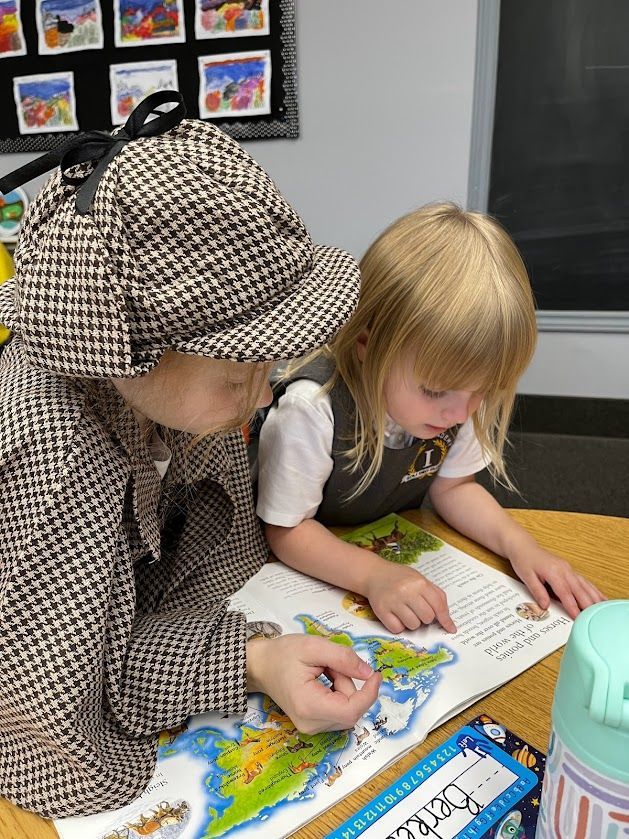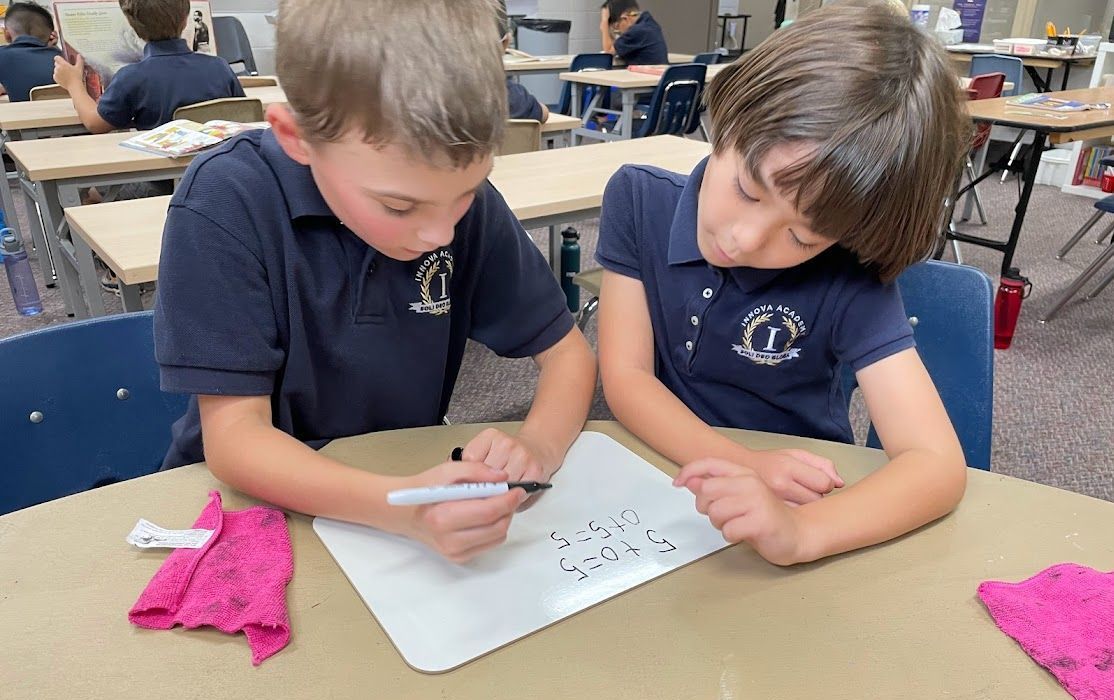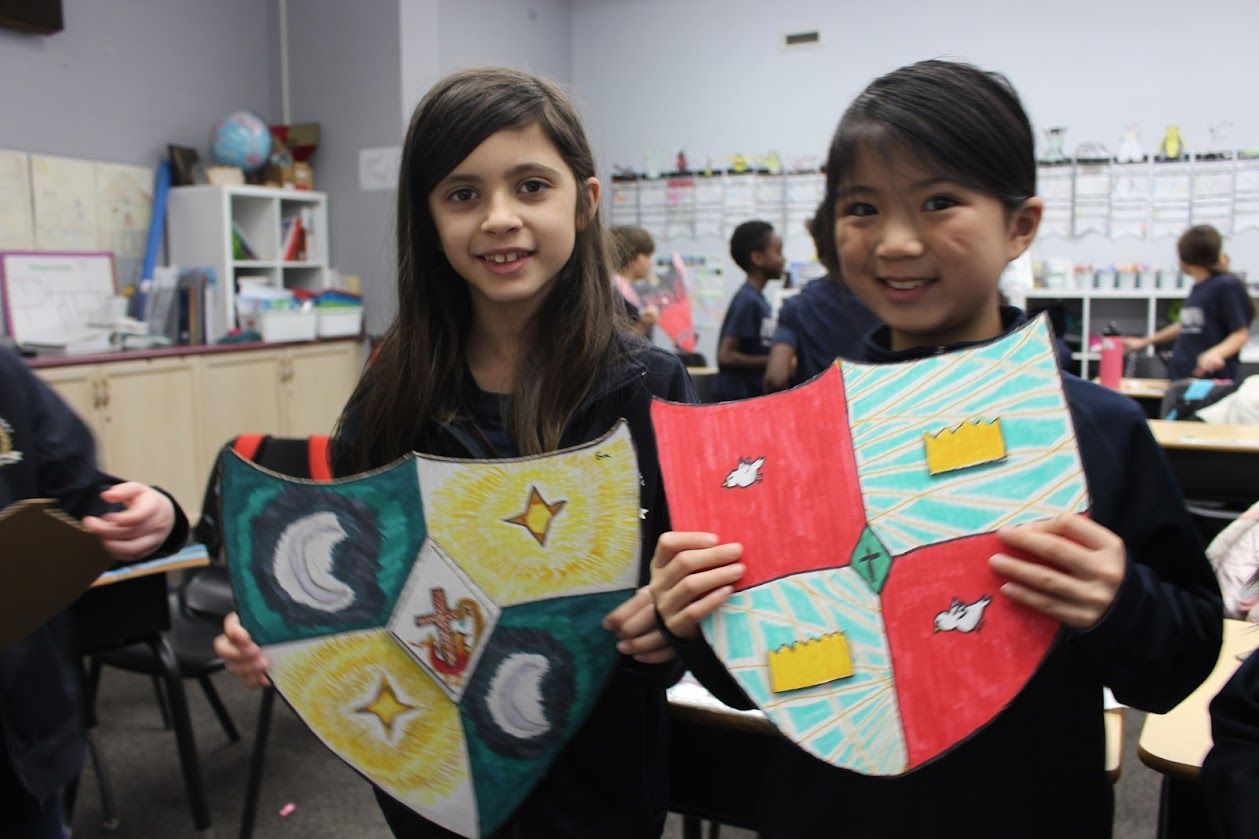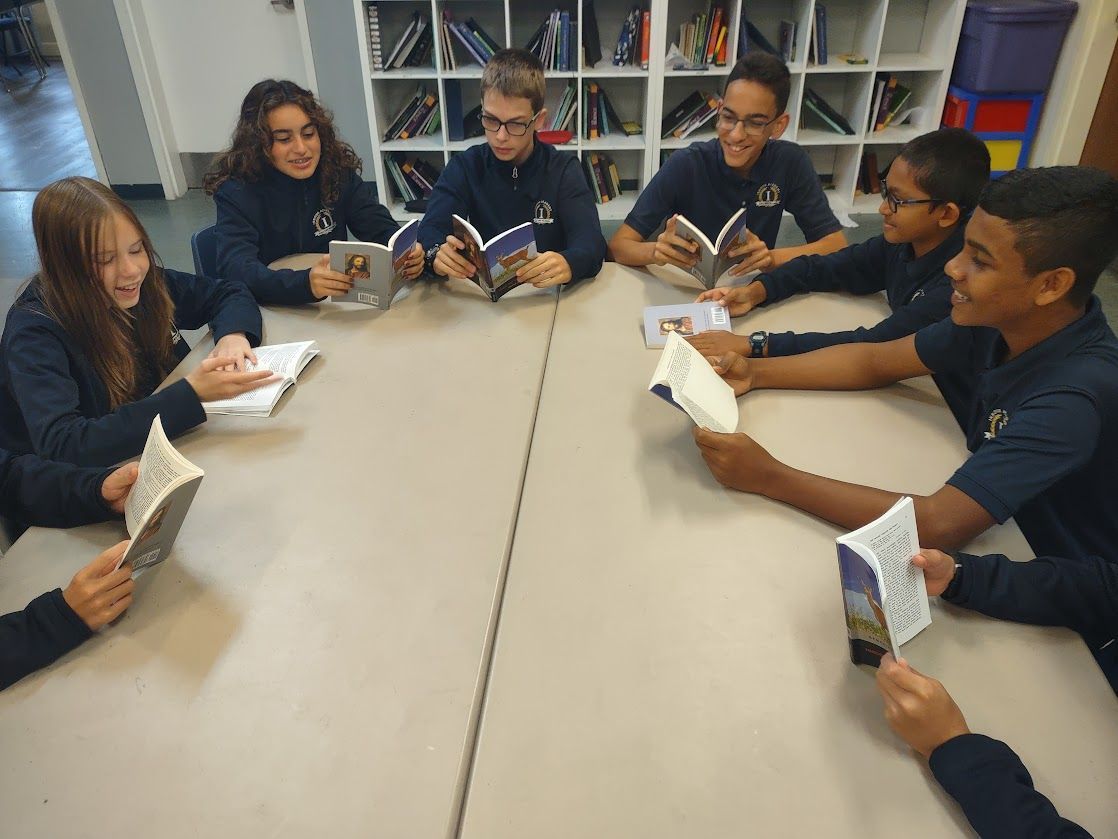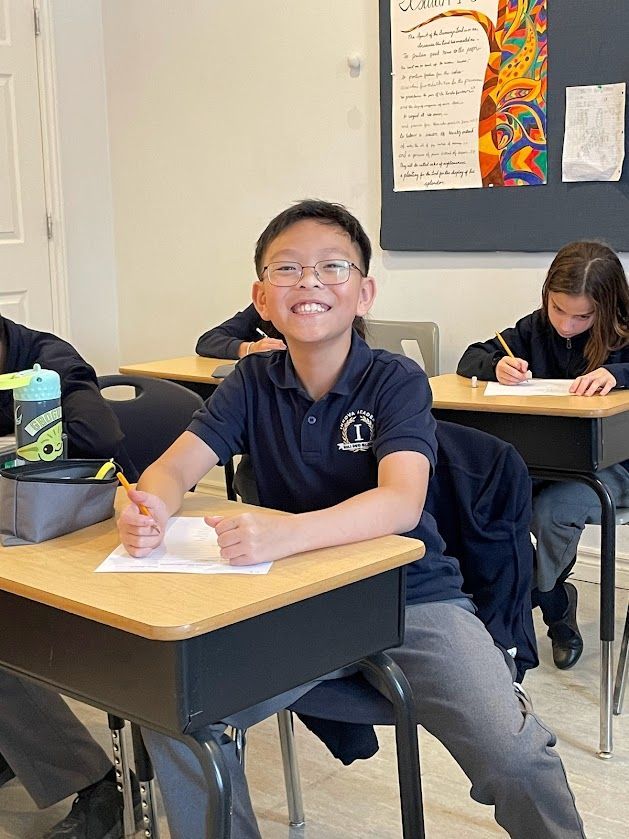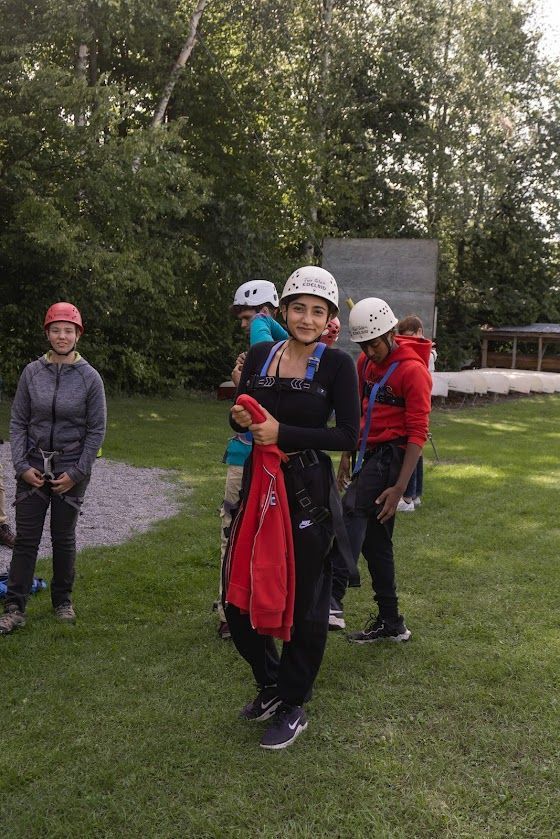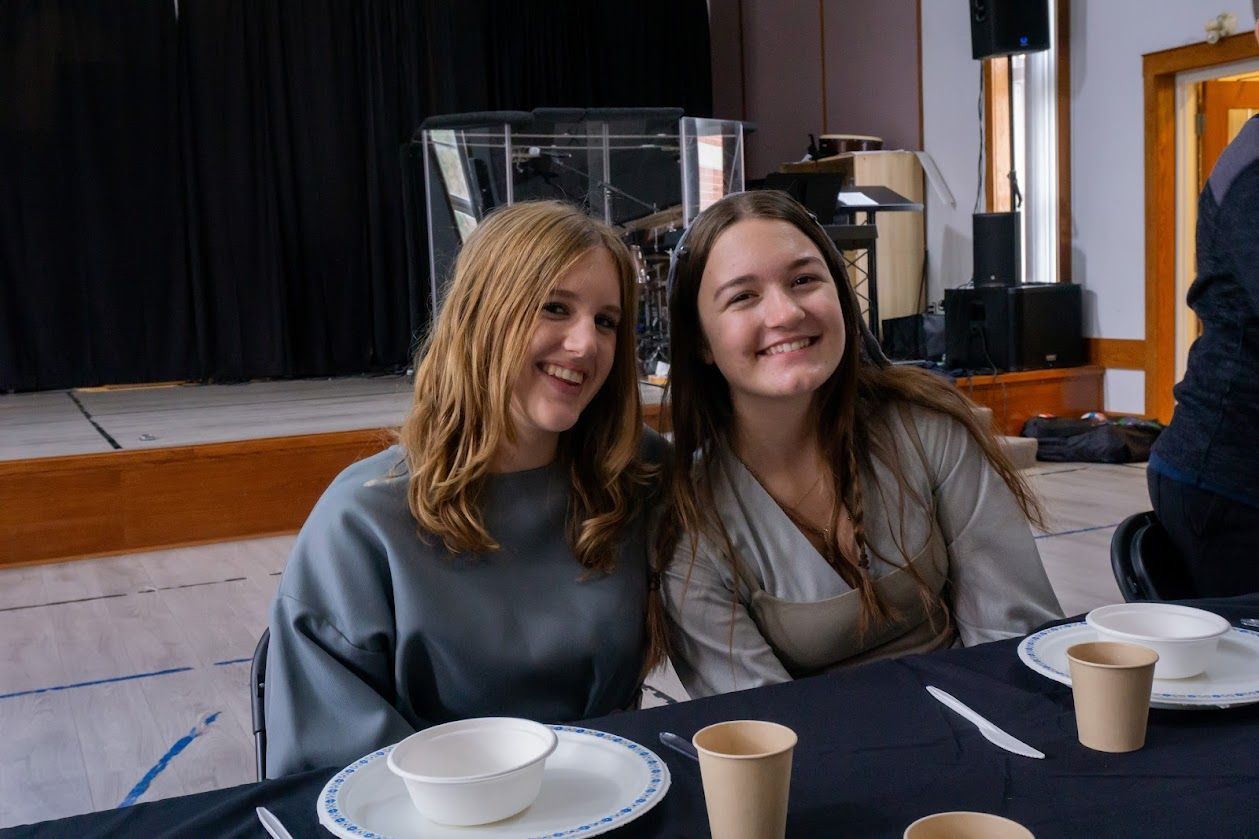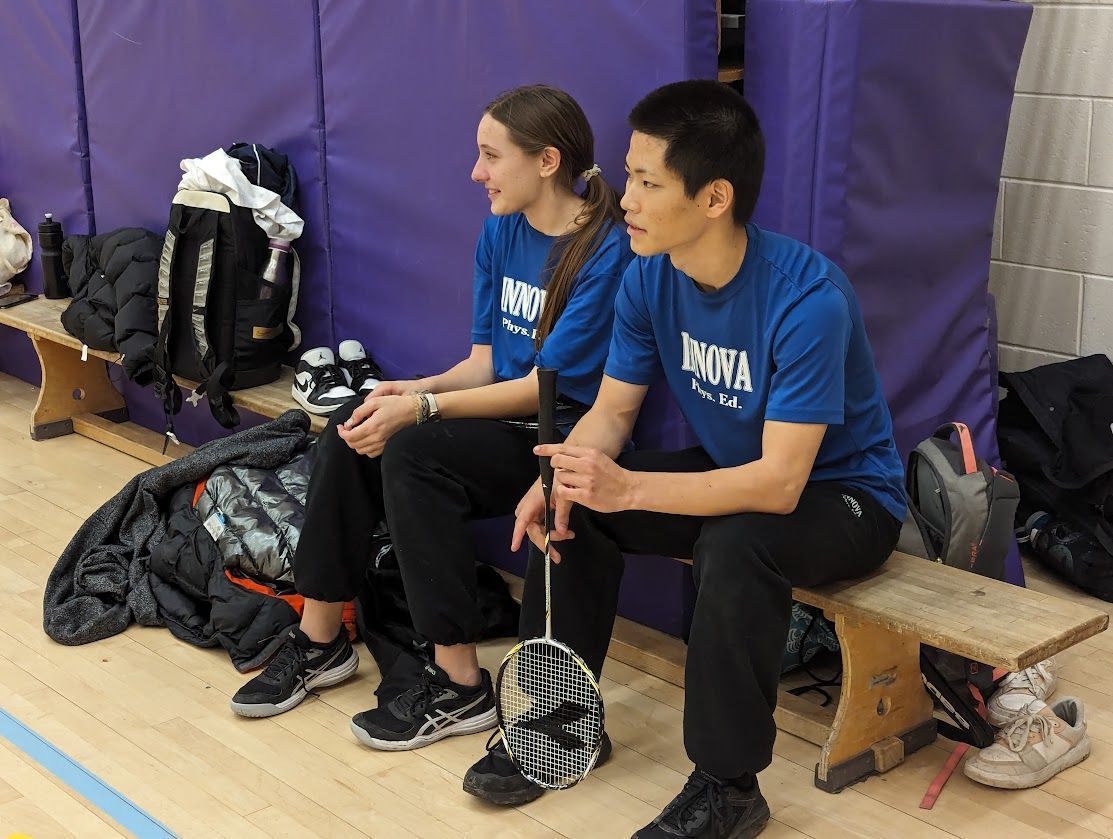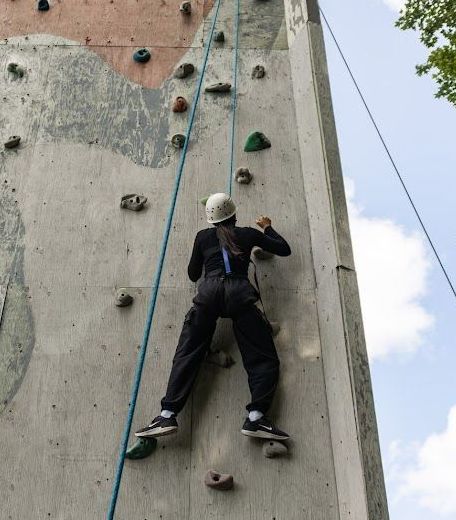In 1947, Dorothy Sayers, a pioneer of modern classical education, observed, “…although we often succeed in teaching our pupils ‘subjects,’ we fail lamentably on the whole in teaching them how to think.”[1] Classical education reaches beyond the acquisition of knowledge to develop skills that are essential throughout life – the ability to think critically, communicate eloquently, and learn independently.
For more information on the classical method of education refer to An Introduction to Classical Education: A Parent’s Guide by Christopher A. Perrin.
[1] Sayers, Dorothy . “The Lost Tools of Learning.” The Lost Tools of Learning. N.p., n.d. Web. 10 June 2014.
<http://www.gbt.org/text/sayers.html>. <http://www.bibme.org/website#>
Why Choose Innova?
It puts God back into the classroom as Teacher
Innova argues that God is extremely relevant and central to all learning. It unashamedly acknowledges the redemptive cross of Jesus, and all knowledge is understood through this.
It’s classical. It is not limited to a decade or century of modern perspective
It is the same method used for thousands of years by the history’s greatest educators and thinkers. “Classical education is the authoritative, traditional, and enduring form of education, begun by the Greeks and Romans, developed through history and now being renewed and recovered in the 21st century” – Perrin.
It is not bound by the Ontario Ministry curriculum
Although Innova offers exceptional academics, Innova’s mission is to surpass provincial expectations and master content in a purposeful way. For example, history is integrated throughout the curriculum in chronological order, rather than in disjointed leaps in time and space to transfer an expected social behaviour or idea. Grade 2 Innova students delve into the beginning of recorded history, early nomads, Ancient Egypt, India and China. Grade 3 students study Ancient Greece, Rome and the early Mayans, and Grade 4 students start with the fall of Rome and discover Medieval and Renaissance history. This is done throughout integrated language, history, bible and art classes.
Its core goal is not academic
Innova’s mission is to shape the heart, because what the child ultimately loves will direct him or her. For “to educate a man in mind and not in morals is to educate a menace to society” – Roosevelt. Innova desires to see hearts formed to love God first and desire his kingdom, and their love for God then shapes their worldview.
It does not shelter students
Innova exposes students to globally prominent ideas from the past and present. Rather than provide a protective bubble that insulates students from thoughts and ideas contradictory to what God desires for his people, Innova inoculates, or purposefully exposes students, equipping them with the tools to navigate through the difficult issues they will eventually come up against.
It is a unique Christian School
It does not try to match the public alternative and then add Bible classes and chapel to make it “Christian.” At Innova, the Bible is the backbone; it is the “thread” that is woven throughout the extensive academic content and tapestry of knowledge.
It believes children have tremendous learning potential
Innova sees the student as God’s image bearer (Imago Dei) and gives students the opportunity to reach their God-given potential.
It extends learning beyond the classroom
Observing a pond ecosystem, making a model of the spinal cord, and meeting a “real knight” are integral at Innova. Frequent opportunities for learning outside of the classroom are a key part of the curriculum, and Innova celebrates various traditions (i.e. Viking Day, A Walk Through History Day, A Knighting Ceremony) that bring learning to life.
It tailors its program to a child’s development and not age
Students are assessed on readiness when they apply and are placed appropriately to ensure individual success. The primary grades focus on learning a large amount of content, because these students are capable of life-long retention. From Grade 6, the students are taught formal logic and then are encouraged to analyse arguments and defend ideas.
It strives for quality and excellence
It does not use out-dated texts that are too expensive to replace. A priority on ongoing training enables teachers to continually hone their craft. Curriculum experts extensively research the best resources on the market to ensure all programs are, indeed, excellent. Innova’s leadership actively supports the teachers to be students of excellence and life-long learners themselves.
Where did Classical Come From?
A Brief History
The origins of classical education lie in the instructive approach of the Ancient Greeks and Romans. Greek scholars considered the development of reason and rhetoric, along with the cultivation of wisdom and virtue, the primary purposes of education. During the Middle Ages, European monastic and cathedral schools adopted and refined classical pedagogy, and by the sixteenth century it was the standard form of education throughout the Western world. Some of the world’s greatest innovators, thinkers, and leaders, including Isaac Newton, Albert Einstein, William Shakespeare, Martin Luther, and C.S. Lewis were classically educated.
Teaching the Trivium
The word trivium means “the three ways,” and was first used during the medieval era to refer to the three components of classical study: grammar (mastery of knowledge), logic (ability to reason), and rhetoric (eloquent communication). While all three disciplines are taught at all grade levels, grammar is emphasized in grades one to four, logic in five to eight, and rhetoric in high school.
What Will Each Grade Will Learn?
Grammar School (JK-Grade 4)
Innova Academy’s grammar school curriculum builds a solid academic foundation, emphasizing mastery of facts and fundamental skills. Grammar stage students have the natural ability to retain large amounts of information, so Innova intentionally builds knowledge across the curriculum immersing students in a holistic, unified, and rich learning experience. Students are actively engaged in learning while applying skills they have previously acquired to new, expansive content. Classrooms are filled with singing, chanting, movement, and engaging hands-on activities. Teachers provide a safe and nurturing classroom environment where students can deepen their awareness of God’s love and relationship with him, as well as meet their potential for academic success. Strong habits of heart, mind, and soul are reinforced, as students become more aware of their impact on others and build skills in self-governance and responsibility.
Bible
Innova Academy teaches the Bible as the infallible Word of God which speaks to every area of life. All scripture testifies to God’s redemptive plan fulfilled in Jesus Christ, and students learn to articulate the gospel, God’s plan of salvation. Junior kindergarten through second grade introduces students to major stories and lessons from scripture, focusing on how God demonstrates his love for us, and how we can show our love for God. Beginning in third grade, students embark on an in-depth chronological study of the Bible. Scripture is presented as part of the historical narrative. Furthermore, the application of scriptural lessons to daily life is central to classroom discussion. Students are challenged to memorize a broad range of scripture from both the Old and New Testaments.
Phonics, Spelling, Vocabulary Development, and Penmanship
Reading, spelling, and penmanship begin in first grade as companion subjects, using a multi-sensory program. During grades one through four, students learn and review the seventy phonograms and spelling rules that make up the English language, combining them to build words with guided teacher direction. By analyzing words, students learn the principles of language in a manner that is phonetically accurate with 99% of the most commonly used English words. Proper penmanship skills are taught, and ample practice provided. Kindergarten and first grade basal readers complement the study of phonics to develop decoding and comprehension skills while engaging students’ interest. Word study is taught using vocabulary from across the curriculum, practicing the use of target vocabulary in a variety of contexts.
Literature
Throughout their school years, students of all grades study the great works of literature. Reading and writing are integral parts of the classical curriculum. Classical schools train students in the command of language – both oral and written. Phonics, grammar, and writing skills are taught in a thorough and systematic manner.
Grammar, Usage, and Mechanics
Innova’s grammar program incrementally and systematically teaches the rules that govern the English language. By practicing analytical skills, students learn to identify the elements of good sentence structure and apply them to original writing.
Writing and Oral Expression
The early years of writing composition focus on writing clear and expressive sentences. Those sentences are turned into strong and informative paragraphs. In grade three, students begin the Writing and Rhetoric program, which is based on the ancient Greco-Roman model of progymnasmata (meaning “preliminary exercises”). These excellent time-tested practices of teaching writing in conjunction with critical thinking and speaking are adapted to meet the needs of today’s students. Students learn from forms and models of excellent writing that they imitate, as they progress down the path to masterful writing and speaking. Some skills taught in grades three and four are summarizing and amplifying a story, rewriting a narrative, adding dialogue, outlining, elocution and narration.
Mathematics
Using the renowned Math in Focus: Singapore Math program, students learn mathematical concepts using a concrete–pictorial–abstract learning progression. This approach helps students develop logical thinking and problem-solving skills to provide a strong foundation for higher level math reasoning. Areas of focus include developing strong number sense, understanding the language of math, and solving problems using a variety of strategies. Students also develop proficiency, speed, and accuracy in math facts recall in all operations.
History and Geography
History begins in junior kindergarten with an exciting tour of world cultures and geography. From first through fourth grade, students are introduced to the events, people, and cultures of world history, as they move chronologically from ancient civilization in first grade, through the medieval era in fourth grade. Using Susan Wise-Bauer’s Story of the World as the primary text, children experience history relayed in an engaging narrative style. As history is integrated with geography, literature, writing, art, and music, students are immersed in the time period, generating enthusiasm and deeper understanding of God’s unfolding story of redemption. In geography, junior kindergarten children begin singing their way around the world, as they learn continents, oceans, and countries. By the end of grammar school, students are able to identify the major countries, capitals, and landforms of the world, and understand how to read and use maps and globes.
Science
Students at Innova Academy will understand that scientific knowledge reveals the orderly and wondrous ways God has designed the universe, and the laws that govern it. Students learn to implement the scientific method, which includes developing hypotheses, conducting investigations and experiments, and recording observations. Teacher-guided inquiry leads students to moments of discovery, offering opportunities to explore and pursue curiosities. Topics of study encompass life sciences, ecology, physics, and introductory chemistry. The study of science enriches students’ knowledge of creation, affirms their faith in the creator, and empowers them to be good stewards of God’s world.
Latin
The study of Latin is a fundamental component of a classical education. Through Latin, students expand their vocabulary, develop a deep understanding of grammar, and learn to think systematically and critically. First and second grade provides a gentle introduction to Latin with lessons peppered with songs, illustrations, stories, games, and engaging activities. Throughout grammar school, students learn Latin vocabulary, grammar, and sayings.
Physical Education
Physical well-being is an essential part of classical and Christian education. Students at Innova Academy understand that God made their bodies to be a temple of the Holy Spirit, and therefore develop their physical abilities to the glory of God. Coordination, endurance, positive attitude, and sportsmanship are emphasized from the earliest grades. Students are taught to demonstrate knowledge of rules and skills in individual and team sports, the importance of following the rules of games, and being gracious in victory as well as in defeat.
Fine Arts
Our fine arts program is twofold: the study of the arts throughout history, and the development of artistic skills. In cultures around the world, music and art have been powerful God-given means of expression. Students study the chronological progress of the fine arts, as they move through their history program.
Our music program is based on Kodaly and Orff methodology. Students develop skills in ear training, reading and writing musical notation, facility with beat, rhythm, and metre, unison and two-part choral singing, and learn to play Orff instruments and recorder.
Our art program introduces students to the works of the masters and encourages them to appreciate and imitate the beauty of creation in their own works of art. Students explore the fundamentals of art: line, shape, texture, value, colour, and perspective. Through drawing, students explore proportion, depth, and shadow. Students knowledgeably use a variety of art media including pencil, crayon, tempera and watercolour paints, and sculpting materials.
Oral Presentation
Developing the ability to communicate clearly and eloquently is an integrated component of every subject. Proper posture, eye contact, body language, volume, expression, pacing, use of effective pauses and avoidance of slang and filler words are practiced. Grammar school students have many opportunities to practice presentation skills through recitation of scripture, poetry, grammar jingles, story and history narration, the presentation of oral reports, and performance of dramatic presentations.
Logic School (Grades 5-8)
The strong knowledge base established in the grammar school provides a solid foundation as students enter the logic school. As perspective widens, students start to make meaningful connections across the curriculum. Students show more independence in their learning and establish systems in self-regulation and personal study skills. Shaping students’ habits of heart, mind, and soul is a key focus as students deepen their understanding of God’s purpose for his creation and their role in his redemptive plan. Teachers continue to foster the love of learning, and students have opportunities to show marked maturity academically and spiritually as they learn to critically analyze ideas and speak to issues in light of God’s purposes.
Bible
Innova Academy teaches the Bible as the infallible Word of God which speaks to every area of life. All scripture testifies to God’s redemptive plan fulfilled in Jesus Christ, and students learn to articulate the gospel, God’s plan of salvation. Grades five and six biblical studies focus on the life of Christ and the growth of the early church. The themes of servanthood and stewardship are studied in depth. Students are taught to interpret verses in context rather than isolation, and introduced to inductive Bible study practices. Beginning in grade six, students study competing worldviews and begin to develop a cohesive Christian worldview through which they can interpret the world around them and respond biblically in their thoughts and actions. Students will also begin to explore Christian apologetics where they examine the validity of the claims of Christianity, exploring such questions as: Is the Bible a historical text, and did Jesus rise from the dead?
Literature
Throughout their school years, students of all grades study the great works of literature. Reading and writing are integral parts of the classical curriculum. Classical schools train students in the command of language – both oral and written. Phonics, grammar, and writing skills are taught in a thorough and systematic manner.
Composition and Oral Communication
Innova Academy’s writing program, Writing and Rhetoric, is based on the ancient Greco-Roman model of progymnasmata, meaning “preliminary exercises”. These excellent time-tested practices of teaching writing in conjunction with critical thinking and speaking are adapted to meet the needs of today’s learners. Students are immersed in models of excellent writing that they imitate as they progress down the path to masterful writing and speaking. In the logic stage, students learn to use sound arguments to explain their opinions, employ narrative to further the purpose of exposition, effectively support a thesis statement, use literary and persuasive devices, write and present speeches, and compose well structured research papers. Oral presentation skills are further developed as students engage in group discussions, memorize great poems and monologues, participate in speech competitions, deliver oral reports, and present dramas.
Grammar, Usage, and Mechanics
Innova’s grammar program incrementally and systematically teaches the rules that govern the English language. By practicing analytical skills, students learn to identify the elements of good sentence structure and apply them to original writing. In the logic stage, students review the parts of speech and learn to identify and properly use complements, phrases, verbals, and clauses. Students review the use of proper punctuation and apply the rules of grammar and punctuation to daily writing across the curriculum.
Mathematics
Using the renowned Math in Focus: Singapore Math program, students learn mathematical concepts using a concrete–pictorial–abstract learning progression. This approach helps students develop logical thinking and problem-solving skills to provide a strong foundation for higher level math reasoning. Students are called upon to demonstrate understanding by applying concepts learned in a variety of ways.
History and Geography
Logic stage students continue their study of chronological world history, beginning with the renaissance and reformation in grade five through modern times in grade eight. As history is integrated with geography, literature, writing, art, and music, students are immersed in the time period, generating enthusiasm and deeper understanding of God’s unfolding story of redemption.
Science
Students at Innova Academy will understand that scientific knowledge reveals the orderly and wondrous ways God has designed the universe and the laws that govern it. The study of science enriches students’ knowledge of creation, affirm their faith in the Creator, and empower them to be good stewards of God’s world. Students learn to articulate how science supports evidence for a creator. Logic school students implement the scientific method (develop hypotheses, conduct experiments, record observations) and topics studied include physiology, motion and force, astronomy, weather, energy and electricity, and geology.
Latin
The study of Latin is a fundamental component of a classical education. Through Latin, students expand their vocabulary, develop a deep understanding of grammar, and learn to think systematically and critically. Logic stage students continue to develop an understanding of Latin grammar and vocabulary, and begin to read Latin texts as well as practice more advanced translation.
Physical Education
Physical well-being is an essential part of classical and Christian education. Students at Innova Academy understand that God made their bodies to be a temple of the Holy Spirit, and therefore develop their physical abilities to the glory of God. Coordination, endurance, positive attitude, and sportsmanship are emphasized. Students will continue to build strength, flexibility, and endurance through physical fitness, set personal goals to improve one’s physical fitness, refine skills in individual and team sports, and learn how to make healthy lifestyle choices.
Fine Arts
Our fine arts program is twofold: the study of the arts throughout history, and the development of artistic skills. In cultures around the world, music and art have been powerful God-given means of expression. Students study the chronological progress of the fine arts as they move through their history program.
Our logic school choral music program is based on Kodaly methodology. Students develop skills in ear training, reading and writing musical notation, facility with beat, rhythm, and metre, and two and three-part singing. Students will further develop music skills and appreciation by learning to play a musical instrument.
Our art program introduces students to the works of the masters and encourages them to appreciate and imitate the beauty of creation in their own works of art. Students explore the fundamentals of art: line, shape, texture, value, colour, and perspective. Through drawing, students explore proportion, depth, and shadow. Students knowledgeably use a variety of art media including pencil, charcoal, tempera, watercolour and acrylic paints, calligraphy supplies, pen and ink, relief carving and block printing tools, and sculpting materials.
High School (Rhetoric School)
Innova Academy Upper School
Why Does It Matter Where I Send My Child for High School?
| Innova Academy | Public | |
|---|---|---|
| Teacher Role Models | All Innova teachers are committed Christians and active participants in their local churches. All agree to Innova’s statement of faith. They actively strive to foster a Christ-like environment in their classes and the school. | Belief systems are taught in the classroom. These include militant secularism, humanism, and moral relativism. |
| Educational Approach | Innova is a classical Christian school. The Christian worldview undergirds all courses taught, and thus, all learning is Christ-honouring. Classical texts (e.g. Homer, Shakespeare, Lewis, etc.) are used to consider ideas. Issues that may arise from secular texts are considered in light of biblical teachings, which serve as the moral and philosophical filter. | Public schools adhere to the progressive educational movement. God has been deliberately removed from the curriculum, and Christian teachers are unable to share their faith or worldview. |
| Academics | Innova is dedicated to academic excellence. The rigorous curriculum helps students exceed the Ontario curricular expectations. Knowing students are capable of far more learning than they are given credit for, Innova uses the best possible curricular resources available and helps students to think logically and express their ideas clearly, while fostering a growing love for learning. | The programme works to meet the Ontario curricular expectations. However, universities are finding that those expectations are often not being met, and students are finding a gap when entering university. |
| Athletics | Physical education is an integral part of the Innova program. While we strive for excellence, sportsmanship and integrity are valued over athletic success. Innova is part of the York Region Athletic Association. | The programme offers various sports at school, often for an additional cost. Specific health and sex education content is provincially mandated. |
| Art & Music | Master of Music and Art Specialists lead the students in developing their unique, God-given gifts. | Subjects can be taught by teachers who are not experts in the field. |
| Advocacy in Student Development | All Innova staff advocate for students not only in academic excellence but also in a growing faith of Christ, encouraging growth in knowledge and wisdom and shaping these students to become passionate followers of Jesus Christ. Students are developed with a focus on social and industrial literacy so they may become effective workers in society. | Teachers support students academically and socially. |
What Will Innova Students Take?
All truth is God’s Truth (Augustine), and subjects are framed around the biblical worldview.
Starting in Grade 9 through to Grade 12, students will take the following courses:
History
Innova teaches history comprehensively and causationally, so that students don’t just know the full, chronological story of what happened, but why it happened and where they fit into that world as Christ followers.
English
Students study an array of great classical texts, from ancient through modern, allowing them to understand the great conversation over 2800 years of the key points of what it is to be human and made in God’s image. They are also taught a rich blend of reading, writing, and speaking skills, which are practiced in assignments and debates.
Science
God’s design and His scientific principles are rigorously studied and joyously celebrated from a Christian perspective. Students have the opportunity to take physical science, general science, physics, biology, and chemistry preparing them with the prerequisites to the most competitive university programs.
Physical and Outdoor Education
Because we are incarnate beings, striving for physical excellence and knowledge give glory to God, and thus considerable emphasis is put on physical education from this perspective.
Art/Music
Beauty in all forms is one of God's most glorious gifts to us, and it is explored rigorously at Innova through visual arts, music, and drama.
Math
While these studies teach and practice concepts and skills necessary for life and expected by provincial standards, Innova extends that learning into real-life critical thinking and problem-solving skills, recognizing God’s order and design in mathematics.
Latin and French
Students will learn French, giving them access to what is thought to be one of the most beautiful languages currently spoken, and Latin, giving them access to a language which undergirds a vast amount of English vocabulary and grammar.
Logic
While critical thinking skills have always been important, one could argue that they have seldom been more important than now. Innova students receive a thorough training in thinking correctly and how to spot logical fallacies.
Theology
Innova students are well grounded in the foundations of the Christian faith, learning not only what these are, but how to defend them in a modern context. Students also learn the value of practicing both the classical and theological virtues in their lives.
Integration and Continuity
Each stage of the trivium corresponds to a four-year teaching sequence using the chronological study of history (Ancients, Middle Ages, Renaissance and Reformation, Modern) as the organizing anchor. Students move through the events, peoples, and worldviews of world history three times, each time at a more complex level.
Subjects are integrated as much as possible. When appropriate, students read the literature of the time period, and write about it, study the art, music, science, and religion of the period, and learn the geography of the places studied. Such integration results in a holistic, coherent, learning experience, so students enthusiastically engage in their studies.
Distinctive Elements
Distinctive subjects taught in a classical Christian school are Latin, (see the article Why Teach Latin?) logic, rhetoric, biblical studies, theology, and apologetics. Throughout their school years, students of all grades study the great works of literature. Reading and writing are integral parts of the classical curriculum. Classical schools train students in the command of language – both oral and written. Phonics, grammar, and writing skills are taught in a thorough and systematic manner.

